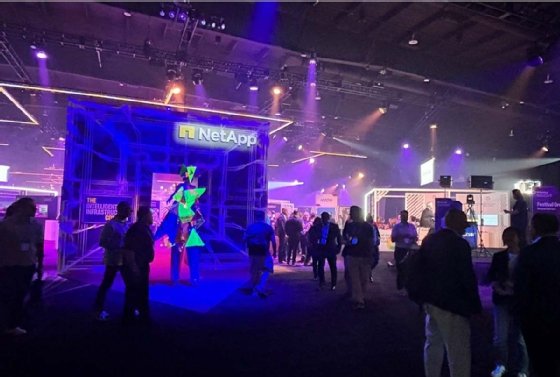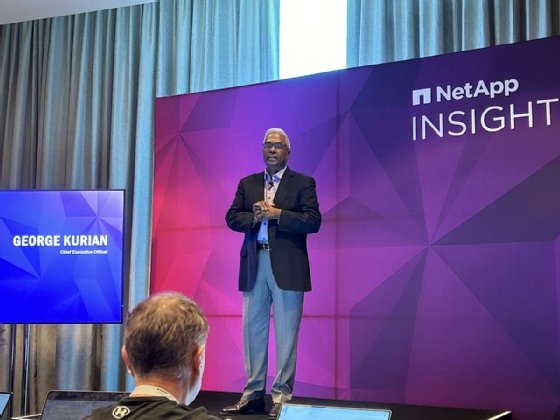
A Stockphoto - stock.adobe.com
NetApp sees data management as its future
A shared metadata namespace searchable through BlueXP and a disaggregated storage architecture for faster generative AI data ingestion will kickstart NetApp's shift into new markets.
LAS VEGAS -- NetApp's OnTap storage OS will enable customers to access, sort and ingest data in NetApp systems on premises and in the public cloud as the company makes headway into data management markets.
During keynotes at NetApp Insight 2024, executives from the vendor outlined their roadmap and future vision for hybrid cloud data management tools, including the new NetApp Metadata Engine and a disaggregated storage network.
Customers at the conference tend to view NetApp primarily as storage hardware seller differentiated by its extensive support services. But they said they believe the shift into data management could help their workloads, assuming the vendor doesn't leave its core storage business behind.
"It's really interesting to see how they are moving away from being a storage OEM, which they basically were, to a storage provider," said Christian Peckart, cloud sales and consult leader at Kyndryl Deutschland, an IT services and consulting company.
"They rarely talk about their actual hardware, but they talk a lot about software," he said. "Because at the end, the software makes the difference."

OnTap on top of data
NetApp released a bevy of data management tools at the show.
The NetApp Metadata Engine will enable customers using OnTap to extract metadata from file and object data to create search and organizational polices using BlueXP, NetApp's control console. Users can choose to manually ingest new data or automatically collate data using customer defined policies set through BlueXP. Supported OnTap environments at launch include on-premises hardware as well as AWS, Microsoft Azure and Google Cloud.
The disaggregated storage architecture will interconnect all customer storage managed by OnTap for more effective use of flash storage and customer networks, according to NetApp executives. This capability is focused on compute-intensive workloads, such as large language model training.
The vendor also relaunched its Cloud Insights observability services as NetApp Data Infrastructure Insights. It is now available as an additional service for Keystone, NetApp's storage-as-a-service offering. The change in branding reflects a renewed focus on hybrid cloud customers, according to executives, with a new SAN Analyzer for block storage environment visibility and new cost calculators for VMware customers.
The NetApp Metadata Engine and disaggregated architecture have no set release date shared by NetApp.
NetApp's customers consider their data to be a product just as much as the goods made or services offered by their organizations, said George Kurian, CEO at NetApp, during his keynote. These new tools should "build a bridge across the abyss" of hybrid cloud storage silos, he said.
"We're now in the era of data and machine intelligence. But what hasn't changed is the importance of managing, protecting and governing data," Kurian said. "We've talked about data as a product. That is even more true today."
Kurian emphasized in a media Q&A that he sees NetApp as being a partner to both customers and technology vendors.
"One of the tenants of NetApp is to co-innovate with the industry leaders," he said. "This needs to unify all of your data continues to grow in importance."

Customer reaction
The push into data management helps NetApp stand out compared with its competitors, Peckart said.
Kyndryl customers have turned to more hybrid cloud infrastructure in recent years, shifting workloads around locations as demand and performance dictates, he said. The new features added to NetApp could help the vendor stand out as generative AI workloads take priority for customers.
"We see a lot of customers moving toward cloud -- but not like we did five years ago -- [by] putting everything in the cloud and then wondering why it's more expensive," Peckart said. "Many customers are also asking us, 'So instead of just managing infrastructure, what do you do in terms of AI -- in terms of network services?'"
Not all customers are fully invested in cloud and still want NetApp to maintain focus on hardware and localized workloads.
Joseph Adkins, a system infrastructure lead with a U.S. government contractor, attended the conference to learn more about NetApp's container services, Astra and Astra Trident.
His organization's infrastructure avoids connecting to the wider internet, rendering new cloud-centric features moot, and his company will avoid generative AI ingestion until the technology matures, he said. NetApp's support services, compared to competitors, help it stand out for future storage procurements, he added.
"From a support and sales standpoint, they're very on top [of what we need]," Adkins said. "I would prefer if they focused a little more on disconnected on-prem networks -- dark sites specifically."
NetApp's renewed focus on data management will help the company differentiate itself in the increasingly competitive and rigid storage market, according to Brent Ellis, an analyst at Forrester Research. Competitors such as Pure Storage require external management software such as Vast Data to offer a similar capability set, he said.
"They're trying to construct a comprehensive storage layer so they can provide a cohesive view of data across multiple infrastructure [and] data layers," Ellis said. "The storage market is highly commoditized. What they want to do is move up from data infrastructure."
Tim McCarthy is a news writer for TechTarget Editorial covering cloud and data storage.






